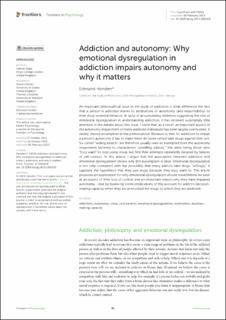Addiction and autonomy: Why emotional dysregulation in addiction impairs autonomy and why it matters
Peer reviewed, Journal article
Published version

View/
Date
2023-02-06Metadata
Show full item recordCollections
- Publikasjoner fra Cristin [3362]
- SPS - Documents [427]
Abstract
An important philosophical issue in the study of addiction is what difference the fact that a person is addicted makes to attributions of autonomy (and responsibility) to their drug-oriented behavior. In spite of accumulating evidence suggesting the role of emotional dysregulation in understanding addiction, it has received surprisingly little attention in the debate about this issue. I claim that, as a result, an important aspect of the autonomy impairment of many addicted individuals has been largely overlooked. A widely shared assumption in the philosophical literature is that for addiction to impair a person’s autonomy it has to make them (in some sense) take drugs against their will. So-called “willing addicts” are therefore usually seen as exempted from the autonomy impairment believed to characterize “unwilling addicts,” the latter being those who “truly want” to stop using drugs but find their attempts repeatedly derailed by failures of self-control. In this article, I argue that the association between addiction and emotional dysregulation shows why this assumption is false. Emotional dysregulation is not only consistent with the possibility that many addicts take drugs “willingly,” it supports the hypothesis that they use drugs because they truly want to. The article proposes an explanation for why emotional dysregulation should nevertheless be seen as an aspect of their loss of control and an important reason why they have impaired autonomy. I end by exploring some implications of this account for addict’s decision-making capacity when they are prescribed the drugs to which they are addicted.
